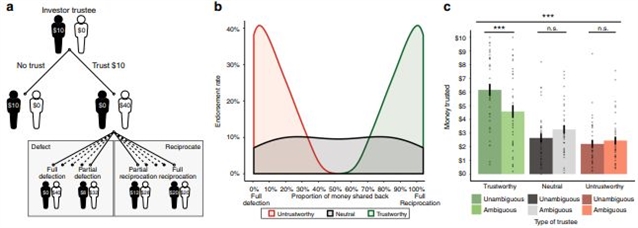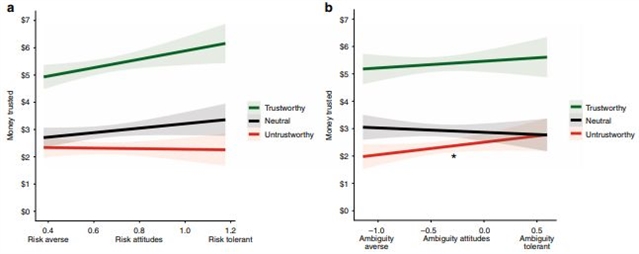论文标题:Tolerance to ambiguous uncertainty predicts prosocial behavior
期刊:Nature Communications
作者:Marc-Lluís Vives & Oriel FeldmanHall
发表时间: 2018/06/12
数字识别码: 10.1038/s41467-018-04631-9
原文链接:https://www.nature.com/articles/s41467-018-04631-9?utm_source=Other_website&utm_medium=Website_links&utm_content=RenLi-Nature-Nature_Comms-Humanities_of_Multidisciplinary-China&utm_campaign=NATCOMMS_USG_rlp8212_Tolerance_sciencenet_article_June_3rd

本周《自然-通讯》发表的一项研究Tolerance to ambiguous uncertainty predicts prosocial behavior表明,在风险回报可能性未知的情况下仍愿意承担风险的人也更有可能与其他人合作并信任他人。

图一:实验2任务结构和结果。信任游戏中的风险投资。
Vives & FeldmanHall
心理学家和经济学家之前已经确定了两种不确定性:风险(其中每一种未来结果的可能性已知)和模糊性(其中每一种结果的可能性未知)。已知个体对这两种不确定性的容忍度不一样。
在这项研究中,美国布朗大学的Oriel FeldmannHall及其同事进行了一系列实验:首先让200名志愿者(106名女性和94名男性)完成单独的赌博游戏,以评估其对风险和不确定性的容忍度。然后让他们玩社交游戏,他们必须决定是否与其他玩家合作。合作可能会让双方都受益,但合作者也可能会被背叛,遭受损失。结果表明模糊性容忍度与亲社会行为量呈正相关。相反,风险容忍度和社会决策之间没有关联。

图二:实验2结果。a.风险容忍度不调节信任行为;b.模糊性容忍度会调节委托给低信誉受托人的金钱数量,但不调节委托给可信赖和中等信誉受托人的金钱数量。Vives & FeldmanHall
作者认为我们把信任他人的决定视为等同于我们不知道可能性的赌博,而且模糊性容忍度所反映的个性特征有助于促进我们的社交行为。
摘要:Uncertainty is a fundamental feature of human life that can be fractioned into two distinct psychological constructs: risk (known probabilistic outcomes) and ambiguity (unknown probabilistic outcomes). Although risk and ambiguity are known to powerfully bias nonsocial decision-making, their influence on prosocial behavior remains largely unexplored. Here we show that ambiguity attitudes, but not risk attitudes, predict prosocial behavior: the greater an individual’s ambiguity tolerance, the more they engage in costly prosocial behaviors, both during decisions to cooperate (experiments 1 and 3) and choices to trust (experiment 2). Once the ambiguity associated with another’s actions is sufficiently resolved, this relationship between ambiguity tolerance and prosocial choice is eliminated (experiment 3). Taken together, these results provide converging evidence that attitudes toward ambiguity are a robust predictor of one’s willingness to engage in costly social behavior, which suggests a mechanism for the underlying motivations of prosocial action.
阅读论文全文请访问:https://www.nature.com/articles/s41467-018-04631-9?utm_source=Other_website&utm_medium=Website_links&utm_content=RenLi-Nature-Nature_Comms-Humanities_of_Multidisciplinary-China&utm_campaign=NATCOMMS_USG_rlp8212_Tolerance_sciencenet_article_June_3rd
特别声明:本文转载仅仅是出于传播信息的需要,并不意味着代表本网站观点或证实其内容的真实性;如其他媒体、网站或个人从本网站转载使用,须保留本网站注明的“来源”,并自负版权等法律责任;作者如果不希望被转载或者联系转载稿费等事宜,请与我们接洽。